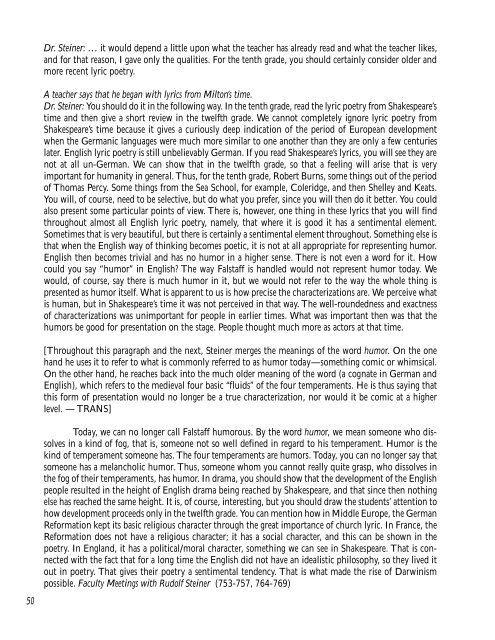Colloquium on English - Research Institute for Waldorf Education
Colloquium on English - Research Institute for Waldorf Education
Colloquium on English - Research Institute for Waldorf Education
Create successful ePaper yourself
Turn your PDF publications into a flip-book with our unique Google optimized e-Paper software.
50<br />
Dr. Steiner: … it would depend a little up<strong>on</strong> what the teacher has already read and what the teacher likes,<br />
and <strong>for</strong> that reas<strong>on</strong>, I gave <strong>on</strong>ly the qualities. For the tenth grade, you should certainly c<strong>on</strong>sider older and<br />
more recent lyric poetry.<br />
A teacher says that he began with lyrics from Milt<strong>on</strong>’s time.<br />
Dr. Steiner: You should do it in the following way. In the tenth grade, read the lyric poetry from Shakespeare’s<br />
time and then give a short review in the twelfth grade. We cannot completely ignore lyric poetry from<br />
Shakespeare’s time because it gives a curiously deep indicati<strong>on</strong> of the period of European development<br />
when the Germanic languages were much more similar to <strong>on</strong>e another than they are <strong>on</strong>ly a few centuries<br />
later. <strong>English</strong> lyric poetry is still unbelievably German. If you read Shakespeare’s lyrics, you will see they are<br />
not at all un-German. We can show that in the twelfth grade, so that a feeling will arise that is very<br />
important <strong>for</strong> humanity in general. Thus, <strong>for</strong> the tenth grade, Robert Burns, some things out of the period<br />
of Thomas Percy. Some things from the Sea School, <strong>for</strong> example, Coleridge, and then Shelley and Keats.<br />
You will, of course, need to be selective, but do what you prefer, since you will then do it better. You could<br />
also present some particular points of view. There is, however, <strong>on</strong>e thing in these lyrics that you will find<br />
throughout almost all <strong>English</strong> lyric poetry, namely, that where it is good it has a sentimental element.<br />
Sometimes that is very beautiful, but there is certainly a sentimental element throughout. Something else is<br />
that when the <strong>English</strong> way of thinking becomes poetic, it is not at all appropriate <strong>for</strong> representing humor.<br />
<strong>English</strong> then becomes trivial and has no humor in a higher sense. There is not even a word <strong>for</strong> it. How<br />
could you say “humor” in <strong>English</strong>? The way Falstaff is handled would not represent humor today. We<br />
would, of course, say there is much humor in it, but we would not refer to the way the whole thing is<br />
presented as humor itself. What is apparent to us is how precise the characterizati<strong>on</strong>s are. We perceive what<br />
is human, but in Shakespeare’s time it was not perceived in that way. The well-roundedness and exactness<br />
of characterizati<strong>on</strong>s was unimportant <strong>for</strong> people in earlier times. What was important then was that the<br />
humors be good <strong>for</strong> presentati<strong>on</strong> <strong>on</strong> the stage. People thought much more as actors at that time.<br />
[Throughout this paragraph and the next, Steiner merges the meanings of the word humor. On the <strong>on</strong>e<br />
hand he uses it to refer to what is comm<strong>on</strong>ly referred to as humor today—something comic or whimsical.<br />
On the other hand, he reaches back into the much older meaning of the word (a cognate in German and<br />
<strong>English</strong>), which refers to the medieval four basic “fluids” of the four temperaments. He is thus saying that<br />
this <strong>for</strong>m of presentati<strong>on</strong> would no l<strong>on</strong>ger be a true characterizati<strong>on</strong>, nor would it be comic at a higher<br />
level. — TRANS]<br />
Today, we can no l<strong>on</strong>ger call Falstaff humorous. By the word humor, we mean some<strong>on</strong>e who dissolves<br />
in a kind of fog, that is, some<strong>on</strong>e not so well defined in regard to his temperament. Humor is the<br />
kind of temperament some<strong>on</strong>e has. The four temperaments are humors. Today, you can no l<strong>on</strong>ger say that<br />
some<strong>on</strong>e has a melancholic humor. Thus, some<strong>on</strong>e whom you cannot really quite grasp, who dissolves in<br />
the fog of their temperaments, has humor. In drama, you should show that the development of the <strong>English</strong><br />
people resulted in the height of <strong>English</strong> drama being reached by Shakespeare, and that since then nothing<br />
else has reached the same height. It is, of course, interesting, but you should draw the students’ attenti<strong>on</strong> to<br />
how development proceeds <strong>on</strong>ly in the twelfth grade. You can menti<strong>on</strong> how in Middle Europe, the German<br />
Re<strong>for</strong>mati<strong>on</strong> kept its basic religious character through the great importance of church lyric. In France, the<br />
Re<strong>for</strong>mati<strong>on</strong> does not have a religious character; it has a social character, and this can be shown in the<br />
poetry. In England, it has a political/moral character, something we can see in Shakespeare. That is c<strong>on</strong>nected<br />
with the fact that <strong>for</strong> a l<strong>on</strong>g time the <strong>English</strong> did not have an idealistic philosophy, so they lived it<br />
out in poetry. That gives their poetry a sentimental tendency. That is what made the rise of Darwinism<br />
possible. Faculty Meetings with Rudolf Steiner (753-757, 764-769)

















